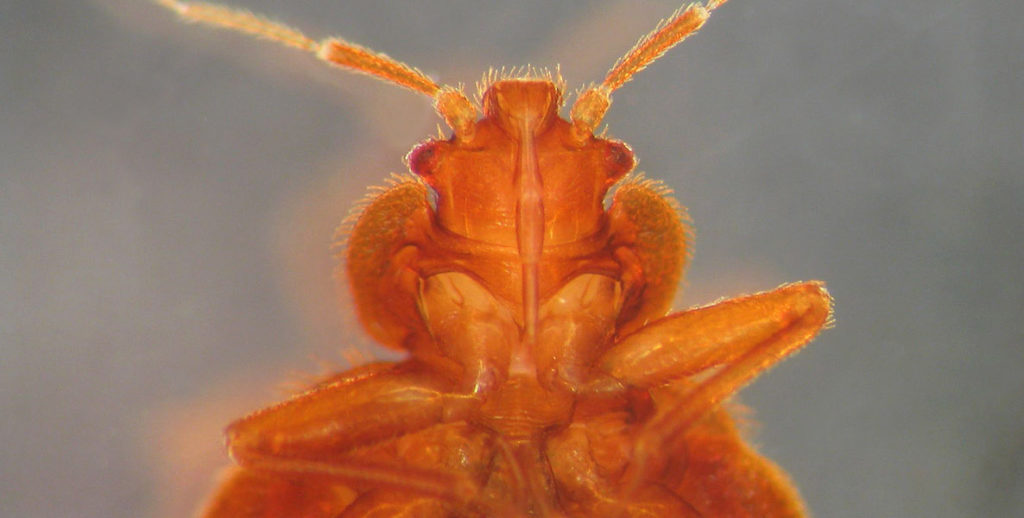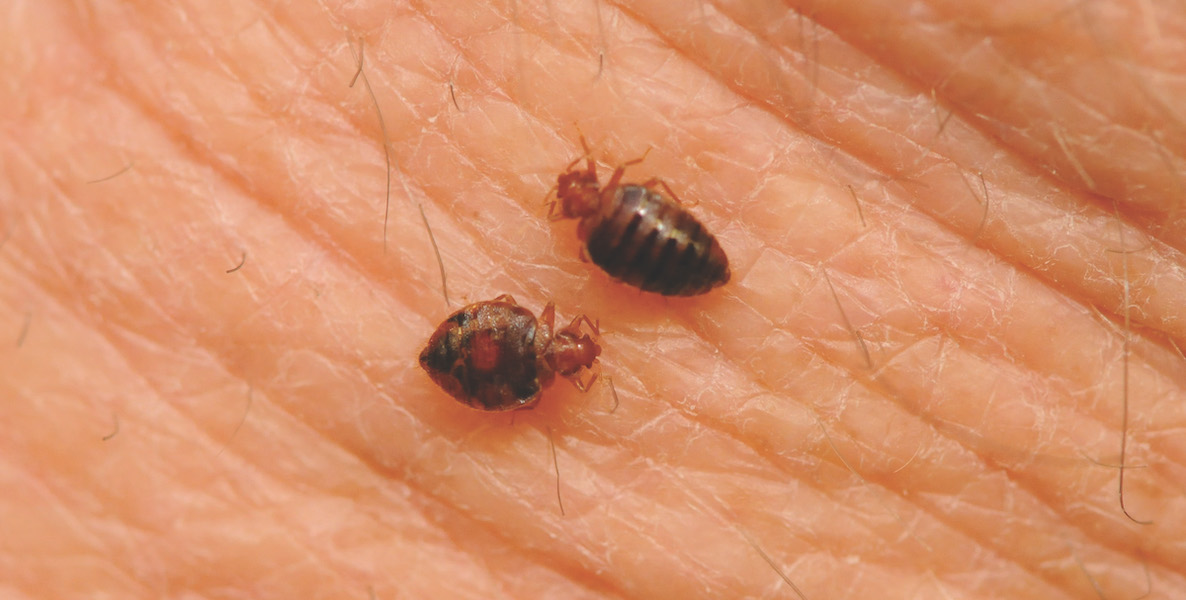This summer, Terminix named Philadelphia the most bed bug-infested city in America, an embarrassing distinction that may have a frustrating correlation: According to pest educator Michelle Niedermeier, Philly is the only major city that doesn’t have an ordinance to help Philadelphians systematically and effectively fight its bed bug problem.

Prefer the audio version of this story? Listen to this article in CitizenCast below:

![]() The environmental health program coordinator at Penn State’s Pennsylvania Integrated Pest Management urban outreach office, Niedermeier has been teaching Philadelphians the most efficient and healthy ways to eradicate pests—mice, cockroaches, bed bugs, mosquitoes—for almost 20 years. She provides outreach education programs to children and families, health professionals and those in social services. She has visited homes where cockroaches drop from ceilings, counseled frazzled citizens on what not to use to attack problems (flamethrowers, essential oils, Windex), and reassured those in the middle of an infestation that there is always a solution. Niedermeier is determined to spread the word to people who most often feel overwhelmed about the safest and most effective practices to keep bugs away.
The environmental health program coordinator at Penn State’s Pennsylvania Integrated Pest Management urban outreach office, Niedermeier has been teaching Philadelphians the most efficient and healthy ways to eradicate pests—mice, cockroaches, bed bugs, mosquitoes—for almost 20 years. She provides outreach education programs to children and families, health professionals and those in social services. She has visited homes where cockroaches drop from ceilings, counseled frazzled citizens on what not to use to attack problems (flamethrowers, essential oils, Windex), and reassured those in the middle of an infestation that there is always a solution. Niedermeier is determined to spread the word to people who most often feel overwhelmed about the safest and most effective practices to keep bugs away.
Six years ago, Niedermeier led a city task force to assess Philly’s bed bug situation, prompted by Councilman Mark Squilla’s experience with the pests in his South Philly home. Nothing came of those recommendations. But Niedermeier has again teamed up with Squilla, who in February introduced legislation to create an official bed bug policy, particularly requiring landlords to notify tenants about past bed bug issues and exterminate infestations. Squilla relayed to us via email that the bed bug bill he has sponsored, “will be scheduled for a hearing in the fall and [we] hope to pass it by the end of the year.”
Meanwhile, we have folks like Niedermeier to help—and give hope—to sufferers of this modern urban plague. “There are always things you can do,” she says. “An ounce of prevention is worth a pound of cure. We should be preventing this from happening. Why wouldn’t we be? Why would we cause people undue stress?”
“There are always things you can do,” she says. “An ounce of prevention is worth a pound of cure. We should be preventing this from happening. Why wouldn’t we be? Why would we cause people undue stress?”
We met up with Niedermeier to get answers to our pest questions and to find out what a resident should do if they discover bed bugs, those bloodsucking six-legged parasites, about the size of an apple seed, that feed off of humans.
Sarah Jordan: What’s the worst pest infestation you’ve witnessed?
Michelle Niedermeier: The thing that gave me the heebie jeebies the most early on in Philadelphia was when I was working on a home-based project where the repair people wouldn’t go in because there was an infestation. We went into the home to assess the situation with a licensed pest control operator. I had never seen a cockroach infestation like this. First of all, I could smell it before I even entered. I was like, “Ooooh, this is gonna be a good one.”
SJ: They have a smell?
MN: Oh yeah, you can smell them. You know how mice have that urine/ammonia/rank/furry smell? Cockroaches have a pungent odor similar to mice. Cockroaches have “frass,” basically like scat, but it looks like coffee grounds. Cockroaches like to hide and be in tight spaces. They like to feel pressure on all sides of their bodies. They like to be “snug as a bug in a rug.” But they were out in the daylight, falling from the ceiling because there were so many of them. There were no more hiding spaces in the cracks and crevices and in the crawl spaces.
SJ: So how was her house remedied?
MN: The woman who lived there had heart conditions and asthma so the tools in the toolbox were narrowed by her health. So we went in with a backpack style vacuum cleaner—totally like Ghostbusters—with a HEPA filter [High Efficiency Particulate Air filter] to stop the particulates from leaving. We vacuumed up the cockroaches. There is great satisfaction when you suck up a cockroach and it goes “thwunk” into the machine.
![]() I don’t feel like I’m out to kill things, but when you’re in your own space, you need to be healthy and happy. These things contribute to poor health and mental health outcomes because you feel stressed and helpless. Or you isolate yourself because you don’t want people to know you have a pest problem because there are stigmas associated with them.The pest control operator also used glue traps in targeted areas and some low toxic pesticides such as Boric acid. Because cockroaches groom themselves, the Boric acid acts as a stomach poison.
I don’t feel like I’m out to kill things, but when you’re in your own space, you need to be healthy and happy. These things contribute to poor health and mental health outcomes because you feel stressed and helpless. Or you isolate yourself because you don’t want people to know you have a pest problem because there are stigmas associated with them.The pest control operator also used glue traps in targeted areas and some low toxic pesticides such as Boric acid. Because cockroaches groom themselves, the Boric acid acts as a stomach poison.
SJ: If we are triaging our pest situation, what is our city’s greatest concern?
MN: Since we don’t have any hard evidence about what is the biggest problem, we are only going on anecdotal evidence. I would say probably mice and cockroaches, and seasonally, I would say mosquitoes and ticks. But, we don’t know because no one is really in charge of all pests. So Vector Control in Environmental Services, which is under the Philadelphia Department of Health, is in charge of mosquitoes and rats because those two things are vectors of disease and that’s what vector control does.
SJ: I thought bed bugs were our biggest problem?
MN: We don’t know how bad the bed bug problem is because no one is in charge of bed bugs. There is no central coordinating agency. It’s hard to say about our number one rating from Terminix because the thing about Philadelphia, which is different from other municipalities, is pest control in Philly is dominated by small business owners, not by companies like Terminix and Orkin. Terminix determines ranking by looking at its service tickets and then it says, based on all service tickets across the country it had the most from Philadelphia. But in a city where most people don’t call Terminix, it’s hard to say how accurate it is.
The greatest effect that bed bugs have on people is related to mental health in terms of stigmas, depression, isolation, which then leads to lost days of work, which leads to loss of income. Without someone in charge saying yes or no, here’s the solution, it’s the wild wild west.
In order to control bed bugs, we really need to approach it in a systematic way— block by block. Because when people have bed bugs, we hear more times than not that “my neighbor has bed bugs, and now it’s spreading down the block in both directions.” We know that bed bugs can travel through cracks and crevices from one house to another. Dr. Changlu Wang in the department of entomology at Rutgers has video of bed bugs walking out under the door of one apartment, down the hallway and under the door of the next apartment.
SJ: How would a Pest Czar work in Philadelphia government?
MN: We already have a Vector Control Division, (Ray Delaney), within the Environmental Health Services (Palak Raval-Nelson, PhD) at the Philadelphia Department of Public Health (Thomas Farley, MD). It deals with mosquitoes and rats. They work closely with restaurant inspections and L&I (and probably other city agencies such as streets because of the cockroaches and rats in the sewers, etc.). To me, it seems like a natural extension of all of this and only makes sense that all departments involved would benefit from having someone with an expertise in pests and integrated pest management (IPM).
SJ: How does Philadelphia’s government stack up against, say New York City or San Francisco, on bed bugs?
![]() MN: We’re failing. New York has an ordinance that’s a partnership between New York Department of Public Health and Mental Hygiene and its housing department; San Fran has policies and ordinances in place. Pretty much every major city has a bed bug ordinance of some sort, even across Pennsylvania. Lancaster has a city ordinance that deals with bed bugs.
MN: We’re failing. New York has an ordinance that’s a partnership between New York Department of Public Health and Mental Hygiene and its housing department; San Fran has policies and ordinances in place. Pretty much every major city has a bed bug ordinance of some sort, even across Pennsylvania. Lancaster has a city ordinance that deals with bed bugs.
SJ: Why not us?
MN: I’m not sure. There’s a lot of digging in. It feels like, “That’s not my job.” The city of Philadelphia has a lot on its plate—as does every other city though. The Health Department doesn’t want bed bugs because it says they don’t spread disease. L&I doesn’t want to deal with bed bugs because it says they are not a structural pest. Both of those things are inaccurate. It is a health concern and they are competent vectors of disease. Are bed bugs currently spreading disease? Not that we know of. Can they? Yes. It is a structural issue and 92 percent of our housing is connected.
The other thing is this isn’t just physical health, it’s mental health that we are dealing with. So, the office of Behavioral Health absolutely should be involved in this as well because currently the greatest effect that bed bugs have on people is related to mental health in terms of stigmas, depression, isolation, which then leads to lost days of work, which leads to loss of income. Without someone in charge saying yes or no, here’s the solution, it’s the wild wild west.
SJ: Does Mayor Kenney’s house have to get bed bugs before something gets done?
MN: You always need a champion, like Councilmember Squilla. He’s a champion of the cause because he doesn’t want anyone to go through what his family went through a few years ago. His family had the financial means to deal with it—generally, it’s somewhere between $300 to $600 a room to treat.
This goes back to a cycle of inequity and injustices. Bed bugs, when they first started resurfacing, probably came with world travelers and things people imported and that sort of thing. It was a problem for wealthy people and hotels, but for the most part hotels have it under control, and wealthy people can hire someone to do the job and do it right. So then it falls to people with less means, who might not do it according to best management practices, who might try to self treat and that has shown to be completely ineffective.
We know that bed bugs can travel through cracks and crevices from one house to another. Dr. Changlu Wang in the department of entomology at Rutgers has video of bed bugs walking out under the door of one apartment, down the hallway and under the door of the next apartment.
SJ: What are some crazy ineffective methods people use?
MN: People get creative in bad ways. They read a lot of things on the internet. We don’t recommend using a blowtorch to chase after any sort of critter in your house. Dryer sheets don’t work for bed bugs or mosquitoes. Mint oil for mice is not effective. People love tea tree oil and think it’s a cure-all, but it can be caustic and irritate the skin. I say heed caution.
SJ: Your work has a domino effect.
MN: We are looking to prevent and solve problems. If we do intervene, we want to make sure what we are doing is solving the problems so that it goes away for good. It feels like missionary work. If we can change one person, hopefully there is a ripple effect. We spend a good deal of time talking to people who go into people’s homes already, such as social workers and home health care visitors. Because if we can’t make it into every home in the state that has a pest issue, we feel that if we train these other people who already go into people’s homes, they can spread the gospel of Integrated Pest Management.
Photo courtesy Courtesy of the National Pest Management Association / Flickr








